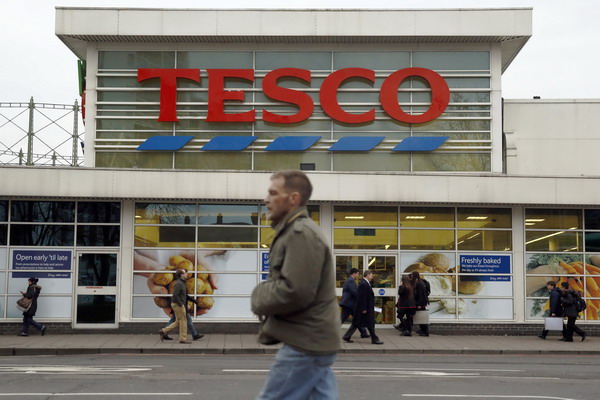Tesco suffers biggest loss in 96-year history
(Agencies) Updated: 2015-04-23 07:45Company seeks to put behind it accounting scandal, management upheaval, slumping sales
 |
|
Pedestrians pass a Tesco supermarket in London January 5, 2015. Britain's biggest grocer Tesco plans to sell assets and cut hundreds of millions of pounds of costs to fund lower prices in store as part of its plan to fight back from the biggest crisis in its 96-year-history. [Photo / Agencies] |
Tesco Plc reported the biggest annual loss in its 96-year history after writing down property values and taking steps to reduce its pension-fund deficit as it seeks to ease increasing financial strains.
The net loss was 5.74 billion pounds ($8.6 billion) in the 53 weeks ended Feb 28, Britain's largest supermarket company said in a statement on Wednesday, seeking to put behind it a year that's included an accounting scandal, management upheaval and slumping sales both at home and internationally.
Chief Executive Officer Dave Lewis is seeking to tackle 8.5 billion pounds of net debt and a 3.9 billion-pound pension deficit. Lewis, aiming to rebuild trust with customers and investors after an overstated profit forecast, said sales declines eased in the fourth quarter as measures such as price cuts led to the first rise in transaction numbers since 2012.
"There are probably more negatives than positives," said Bryan Roberts, an analyst at Kantar Retail in London. "The overall loss is a lot worse than anyone had envisaged. On the plus side, UK trading momentum is positive."
Tesco shares were little changed at 235.10 pence at 8:09 am in London trading. They've risen 25 percent this year on optimism that Lewis will be able to revive the business.
The scale of the loss was driven by a 4.7 billion-pound writedown on the value of Tesco's stores, the grocer said, following in the footsteps of its main competitors. The growth of online shopping, convenience stores and budget outlets have all contributed to the slumping values for superstores.
Total one-time charges against profit amounted to 7 billion pounds, and were mainly non-cash, Tesco said.
More debt
Net debt increased by 1.9 billion pounds in the year and the retailer's pension deficit widened by 1.3 billion pounds, increasing the strain on its finances at a time when Lewis is ploughing money into price cuts to help withstand competition from discounters Aldi and Lidl.
- Italian SMEs eye opportunities at China's provincial level
- Microsoft China cloud business sees 'good growth rates'
- Chinese lawmakers protect retail investors
- Belt and Road Initiative facilitates more opening-up
- China to become world's biggest aviation market in 2030
- China's tolerance for small SOE defaults to rise
- Vice Premier vows to further develop FTZs in China
- China's ODI to maintain double-digit growth

















